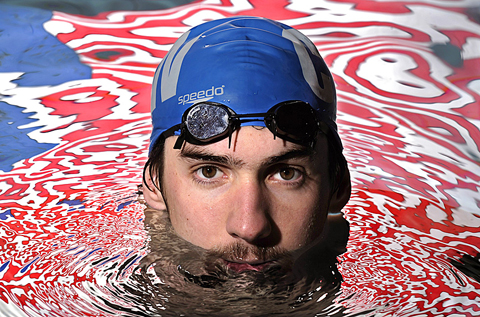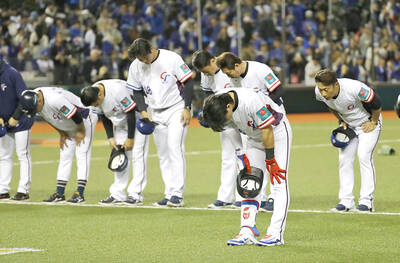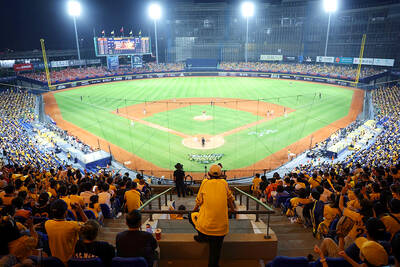Michael Phelps, space-age swimsuits and 108 world records made this a year in swimming that may never be matched.
Phelps broke Mark Spitz’s 36-year-old record by swimming to eight golds at the Beijing Olympics, overshadowing everything else accomplished inside the Water Cube — from Stephanie Rice’s three golds to Alain Bernard’s foam-filled sprint victory in the 100m freestyle to Rebecca Adlington’s sweep in the 400m and 800m free.
In February, Speedo unveiled its LZR Racer suit, which was designed with help from NASA. A big hint of the suit’s impact on the sport was evident at the short-course World Championships in April, when 18 world records were set over just five days in Manchester, England.

PHOTO: AP
Only three world records were set at the previous short-course worlds in Shanghai two years earlier.
By the end of the year, the tally was 55 long-course world records and 53 in short-course pools — with the great majority of them set by swimmers wearing the LZR.
Swimming’s governing body FINA first addressed the issue of high-tech suits at the meet in Manchester, and sent the other makers scrambling by declaring that the LZR met all rules.
Mark Schubert, head coach of the US Olympic team and a longtime Speedo man, went so far as to tell everyone on his squad to wear the LZR at the US Trials, warning they risked “ending up at home watching [the Olympics] on NBC.”
In May, California-based TYR Sport filed a federal lawsuit alleging that rival Speedo had conspired with USA Swimming to stifle competition and lure top athletes away from other companies.
USA Swimming changed its tune after the games, calling for FINA to limit the high-tech suits for the good of the sport, and a group of 15 national teams competing at the short-course European Championships in Croatia two weeks ago signed a protest letter calling on FINA to create better guidelines regulating the suits.
Swimming Australia joined the debate last week, calling on FINA to stop approving new suits and enforce a rule restricting swimmers to wearing one suit at a time. Some competitors have worn two and even three suits in races to create a more streamlined body shape and guard against the stretched-tight material splitting.
Critics of the high-tech suits believe they create illegal levels of buoyancy. Italy coach Alberto Castagnetti told reporters in April that the suits amounted to “technological doping,” which became a rallying cry for opponents of the suits.
“In March, everyone called us crazy and left us all alone to fight FINA,” Arena global marketing director Giuseppe Musciacchio told reporters earlier this month.
“Now, I’m reading things every day with the NCAA, USA Swimming and Australia saying the same things we were saying back then,” he said.
“When you open a door without rules, chaos follows. Hundreds of suits have been submitted for approval by FINA over the last few months, but really the companies that support swimming are very few. Nike has already pulled out and Adidas is heading in the same direction. If they look at the economic direction this is taking, FINA won’t be very happy,” he said.
FINA has commissioned research from a university to examine the thickness of new suits and design a scientific test that will determine whether they are “credible” within the sport. Upcoming meetings with manufacturers and coaches could resolve the situation.

Taiwan kept their hopes of advancing to next year’s World Baseball Classic (WBC) alive with a 9-1 victory over South Africa in a qualifier at the Taipei Dome on Saturday, backed by solid pitching. Taiwan last night played against Nicaragua. As of press time, Nicaragua was leading 6-0. Bouncing back from Friday’s struggles on the mound, when Taiwanese pitchers surrendered 15 runs to Spain, Team Taiwan on Saturday kept the visiting team in check, allowing just one run in the bottom of the fourth inning. Starting pitcher Sha Tzu-chen struck out one and allowed no hits, except for a hit-by-pitch over

Taiwan kept its hopes of advancing to the 2026 World Baseball Classic (WBC) alive with a 9-1 victory over South Africa in a qualifier at the Taipei Dome last night, backed by solid pitching. Bouncing back from Friday’s struggles on the mound, when Taiwanese pitchers surrendered 15 runs to Spain, Team Taiwan kept the visiting team in check, allowing just one run in the bottom of the fourth inning. The win was crucial for Taiwan, as a loss would have eliminated the team from contention for the next WBC. Starting pitcher Sha Tzu-chen (沙子宸) struck out one and allowed no hits, except for

Team Taiwan are set to face Spain in a win-or-go-home match tonight for the final berth at the 2026 World Baseball Classic (WBC), despite losing to Nicaragua 6-0 in the WBC qualifier at the Taipei Dome on Sunday. The home team’s loss on Sunday means Nicaragua finish first in the qualifier round in Taipei with a perfect 3-0 record and advances to next year’s finals. After crushing South Africa 9-1 earlier on Sunday, Spain took second place in the four-team qualifier with a 2-1 record. With a 1-2 record, Taiwan finished third while South Africa placed at the bottom with

The Chinese Professional Baseball League (CPBL) is considering reducing its pitch clock by two seconds to help players better adjust to the rules applied at the World Baseball Classic (WBC). The proposal aims to shorten the pitch timer from 25 seconds to 23 seconds with the bases empty, and from 20 seconds to 18 seconds with runners on base. Currently, the WBC mandates that pitchers deliver a pitch every 18 seconds with the bases empty and 15 seconds with runners on base. The issue was raised during a pre-season CPBL managers’ meeting on Tuesday by Rakuten Monkeys bench and batting